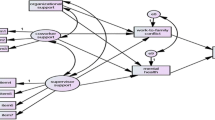Abstract
Group home programs for youths were investigated in order to: (a) measure employment longevity in four occupational groups employed in group home treatment settings, (b) report current working conditions and job satisfaction levels, and (c) compare relationships between the group home work environment and employee job satisfaction. Subjects included 57 current and 51 former administrative/treatment employees from 26 participating group homes in Kansas. Several differences were found among four different occupational groups in employee longevity, work environment and satisfaction levels. Length of employment was longest for teaching-parents, followed respectively by houseparents, directors, and other employees. Eight significant work environment differences and five job satisfaction differences were reported among the four groups. Fourteen significant correlations were reported between work environment variables and job satisfaction ratings. A regression analysis reported significant predictors of two “overall” job satisfaction ratings. The research suggested that (1) group home employees have short tenures, (2) the different occupational groups have differing job satisfaction levels, (3) better working conditions are related to higher job satisfaction ratings, and (4) employee contact with the youths is related inversely to improvements in job satisfaction.
Similar content being viewed by others
References
Armstrong, S. Personal communication, July 1975.
Braukmann, C.J., Kirigin, K.A., & Wolf, M.M.Achievement Place: The researchers' perspective. Paper presented at the American Psychological Association Meetings, Washington, D.C., 1976.
Braukmann, C.J., Fixsen, D.L., Kirigin, K.A., Phillips, E.A., Phillips, E.L., & Wolf, M.M. Achievement Place: The training and certification of teaching-parents. In W.S. Wood (Ed.),Issues in Evaluating Behavior Modification. Champaign, Ill.: Research Press, 1976
Eck, S.B. Personal communication, May 1975.
Fournet, G.P., DiStephano, M.K., & Pryer, M.W. Job satisfaction: Issues and problems.Personnel Psychology 1965,19 165–183.
Gula, M. Group homes—new and differentiated tools in child welfare, delinquency, and mental health. InGroup Homes in Perspective, Child Welfare League of America, Inc., 1972, 1–5.
Harris, V.W. Personal communication, May 1975.
Kirigin, K.A., Ayala, H.E., Braukmann, C.J., Brown, W.G., Fixsen, D.L. Phillips, E.L., & Wolf, M.M. Training teaching-parents: An evaluation and analysis of workshop training procedures. In E. Ramp and G. Semb (Eds.),Behavior Analysis: Areas of Research and Application, Englewood Cliffs, New Jersey: Prentice-Hall, 1975.
Miller, L.A., & Muthard, J.E. Job satisfaction and counselor performance in state rehabilitation agencies.Journal of Applied Psychology 1965,49 280–283.
Phillips, E.L., Phillips, E.A., Fixsen, D.L., & Wolf, M.M. Achievement Place: Behavior shaping works for delinquents.Psychology Today, June 1973.
Phillips, E.L., Phillips, E.A., Fixsen, D.L., & Wolf, M.M.The Teaching-Family Handbook (2nd ed.). Lawrence, Ks: University of Kansas Printing Service, 1974.
Ronan, W.W. Individual and situational variables relating to job satisfaction.Journal of Applied Psychology 1970,54 1–30.
Sarata, B.V.P. The impact of staff job satisfaction upon services provided to retarded clients. Paper presented at the American Psychological Association Meetings, New Orleans, 1974.
Smits, S.J. Counselor job satisfaction and employment turnover in state rehabilitation agencies: A follow-up study.Journal of Counseling Psychology 1972,19 512–517.
The teaching-parent job satisfaction questionnaire.The Teaching-Family Newsletter, 1974–1975,1, (3–4), and 2, (1–3).
Author information
Authors and Affiliations
Additional information
Richard T. Connis is now at the Department of Psychology, University of Washington, Seattle; Robert E. Kifer is now at Sagamore Children's Center, Melville, New York; and Dean L. Fixsen and Elery L. Phillips are now at Father Flanagan's Boys Home, Omaha, Nebraska.
Rights and permissions
About this article
Cite this article
Connis, R.T., Braukmann, C.J., Kifer, R.E. et al. Work environment in relation to employee job satisfaction in group homes for youths. Child Youth Care Forum 8, 126–142 (1979). https://doi.org/10.1007/BF01554713
Issue Date:
DOI: https://doi.org/10.1007/BF01554713



